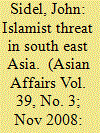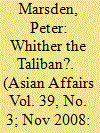|
|
|
Sort Order |
|
|
|
Items / Page
|
|
|
|
|
|
|
| Srl | Item |
| 1 |
ID:
084829


|
|
|
|
|
| Publication |
2008.
|
| Summary/Abstract |
The author reviews the potential for forging academic links with Asia, the different models of engagement available, the balance between academic requirements and financial demands, the governance structures required for building successful, sustainable academic links and finally issues of quality assurance of teaching and research programmes being offered either jointly with partners in Asia or through off-shore campuses. This is the edited text of the Anniversary Lecture which he delivered after the Annual General Meeting on 11 June, 2008.
|
|
|
|
|
|
|
|
|
|
|
|
|
|
|
|
| 2 |
ID:
084831


|
|
|
|
|
| Publication |
2008.
|
| Summary/Abstract |
Oldfield served as the doctor at the British Residency in Kathmandu from 1850 to 1863, during the early years of the reign of Jang Bahadur Rana. Most previous Nepali art was religious art, but Oldfield's water-colours are of secular subjects and as such provide important information on the architecture of the Kathmandu valley at that time. His work was so accurate that it has helped to guide some recent restoration projects. The article is illustrated by ten of his pictures, eight in colour. They include two pictures of Jang Bahadur's army closing on Kyaurung , on the Tibetan border
|
|
|
|
|
|
|
|
|
|
|
|
|
|
|
|
| 3 |
ID:
084832


|
|
|
|
|
| Publication |
2008.
|
| Summary/Abstract |
McDowall relates how in 2005, contrary to the predictions of many western observers, Ahmadinejad was elected as President of Iran, reflecting popular disillusion with the reformist president, Khatami, and the rise of a new generation of politicians, whose relationships had been forged during the war with Iraq. Ahmadinejad came to power at an opportune moment: he could profile himself as an opponent of America and Israel. Wholesale changes in personnel formed the other mark of his revolution. Four years on, his populist economic policies have not proved effective, which could be significant in terms of the 2009 presidential elections. The crucial question is whether there is a suitable opposition candidate who might run against him. This is the edited text of the lecture which he gave to the Society on Wednesday 7 May 2008.
|
|
|
|
|
|
|
|
|
|
|
|
|
|
|
|
| 4 |
ID:
084828


|
|
|
|
|
| Publication |
2008.
|
| Summary/Abstract |
Professor John Sidel argues that coverage of terrorist events in South East Asia focuses on description, rather than explanation, events rather than causes. He suggests that Islamist forces in South East Asia are in retreat: terrorist violence reflects frustration at a reduction in political influence, not a rising tide of Islamisation. In a review of the situation in four individual countries, Indonesia, the Philippines, Malaysia and Southern Thailand, he asserts that the number of terrorist attacks is not increasing and in Indonesia at least is in absolute decline. This article is based on a lecture he delivered as part of the Southeast Asia Seminar Series at St Antony's College, University of Oxford.
|
|
|
|
|
|
|
|
|
|
|
|
|
|
|
|
| 5 |
ID:
084833


|
|
|
|
|
| Publication |
2008.
|
| Summary/Abstract |
This is the history of the search for, and eventual discovery of, oil in Oman, from the first geological survey in 1925 by George Lees and his party through to modern times. For many years survey work was hampered by disputes between the tribes and the Sultan. Then bad luck with the Fahud-1 well in 1957 meant that it was not until 1963 that oil was finally struck in the Natih field. Oil quickly became the mainstay of the Omani economy. This is the slightly edited text of the lecture which he delivered to the Society on 20 February 2008.
|
|
|
|
|
|
|
|
|
|
|
|
|
|
|
|
| 6 |
ID:
084834


|
|
|
|
|
| Publication |
2008.
|
| Summary/Abstract |
This article examines the experiences of Persia of four British writers, whose travels were spread over the nineteenth century. David Blow describes, and quotes extensively from, their published works. He begins with Captain John Malcolm, who first visited Persia as a diplomatic envoy in 1800, then turns to the archaeologist, Henry Layard, who spent months with the semi-nomadic tribes in south-west Persia in1840/1841. Blow then relates the journeys of Isabella Bishop through western Persia which took place in 1889. Coincidentally this was almost at the same time as the journey to Persia of Lord Curzon, whose great work Persia and the Persia Question, crowns all 19th century writing on Persia. This is the edited text of the lecture which he gave to the Society on 21st May 2008.
|
|
|
|
|
|
|
|
|
|
|
|
|
|
|
|
| 7 |
ID:
084830


|
|
|
|
|
| Publication |
2008.
|
| Summary/Abstract |
The article considers the failed attempts by Amir Amanullah and Mohammed Daud to promote reform in Afghanistan, before sketching the early origins of the Taliban in the madrassahs of Pakistan, the realities of Pushtun identity and the process of radicalisation of the Taliban administration after 9/11. The nature of their current support base is evaluated in the context of the methods used by the Coalition forces and the performance of the Afghan Government. The conclusion is that the best hope of a solution lies in some sort of negotiated settlement, but the social space for any deal is very restricted, given the conservatism of the vast majority of Afghans. This is an expanded version of a presentation he gave to members of the Society on 14 January 2008.
|
|
|
|
|
|
|
|
|
|
|
|
|
|
|
|
|
|
|
|
|